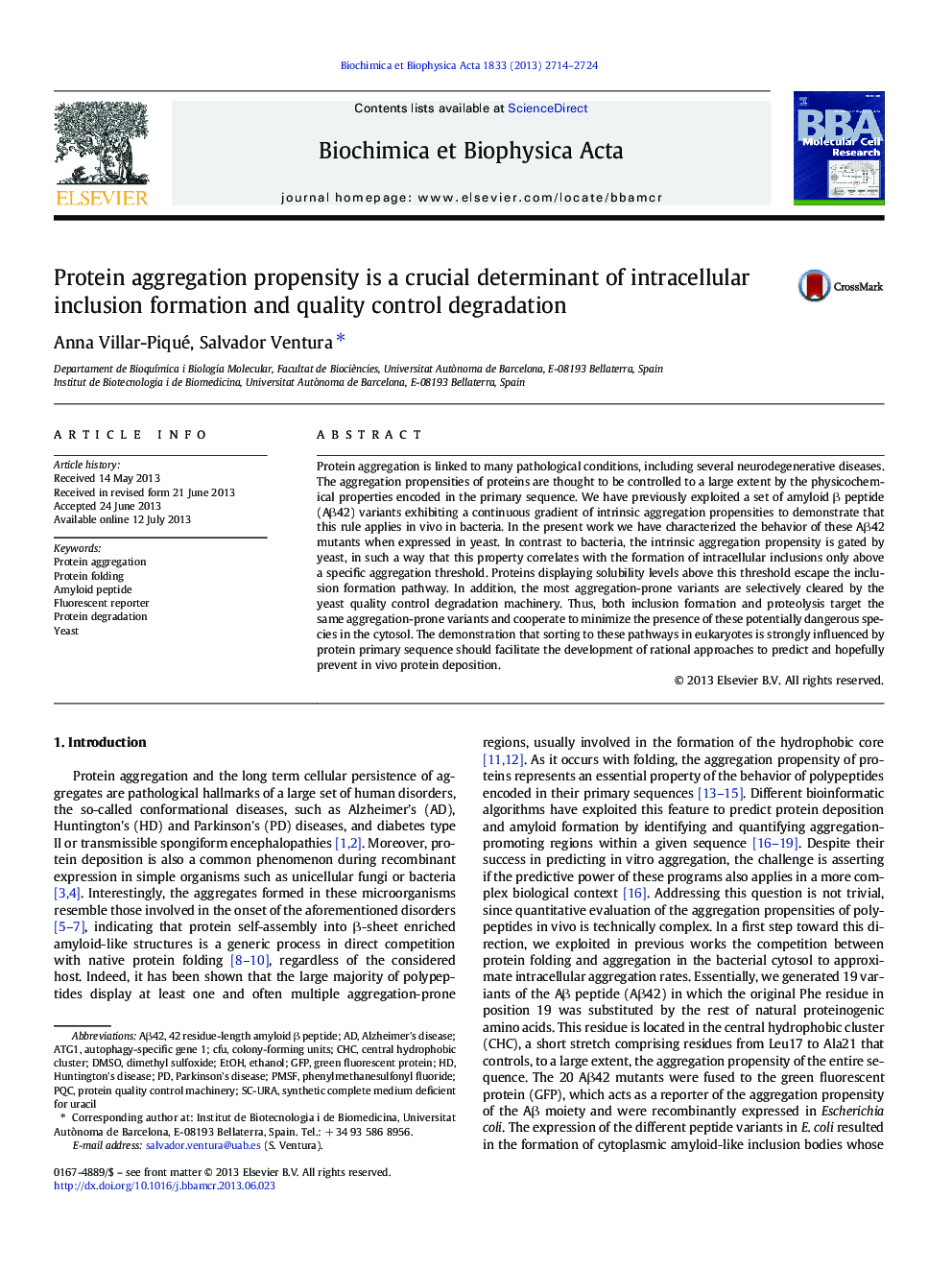| کد مقاله | کد نشریه | سال انتشار | مقاله انگلیسی | نسخه تمام متن |
|---|---|---|---|---|
| 8303856 | 1537956 | 2013 | 11 صفحه PDF | دانلود رایگان |
عنوان انگلیسی مقاله ISI
Protein aggregation propensity is a crucial determinant of intracellular inclusion formation and quality control degradation
ترجمه فارسی عنوان
تمایل به تجمع پروتئین، عامل مهمی در شکل گیری درون سلولی و کنترل کیفیت آن است
دانلود مقاله + سفارش ترجمه
دانلود مقاله ISI انگلیسی
رایگان برای ایرانیان
کلمات کلیدی
CFUPQCSC-UraAtg1CHCAβ42PMSFGFPEtOHDMSO - DMSOEthanol - اتانولAlzheimer's disease - بیماری آلزایمرHuntington's disease - بیماری هانتینگتونParkinson's disease - بیماری پارکینسونProtein folding - تاشدگی پروتئینprotein aggregation - تجمع پروتئینProtein degradation - تخریب پروتئینFluorescent reporter - خبرنگار فلورسنتDimethyl sulfoxide - دیمتیل سولفواکسیدPhenylmethanesulfonyl fluoride - فنیل متیل سولفونیل فلورایدYeast - مخمرcolony-forming units - واحدهای تشکیل دهنده کلنیgreen fluorescent protein - پروتئین فلورسنت سبزamyloid peptide - پپتید آمیلوئید
موضوعات مرتبط
علوم زیستی و بیوفناوری
بیوشیمی، ژنتیک و زیست شناسی مولکولی
زیست شیمی
چکیده انگلیسی
Protein aggregation is linked to many pathological conditions, including several neurodegenerative diseases. The aggregation propensities of proteins are thought to be controlled to a large extent by the physicochemical properties encoded in the primary sequence. We have previously exploited a set of amyloid β peptide (Aβ42) variants exhibiting a continuous gradient of intrinsic aggregation propensities to demonstrate that this rule applies in vivo in bacteria. In the present work we have characterized the behavior of these Aβ42 mutants when expressed in yeast. In contrast to bacteria, the intrinsic aggregation propensity is gated by yeast, in such a way that this property correlates with the formation of intracellular inclusions only above a specific aggregation threshold. Proteins displaying solubility levels above this threshold escape the inclusion formation pathway. In addition, the most aggregation-prone variants are selectively cleared by the yeast quality control degradation machinery. Thus, both inclusion formation and proteolysis target the same aggregation-prone variants and cooperate to minimize the presence of these potentially dangerous species in the cytosol. The demonstration that sorting to these pathways in eukaryotes is strongly influenced by protein primary sequence should facilitate the development of rational approaches to predict and hopefully prevent in vivo protein deposition.
ناشر
Database: Elsevier - ScienceDirect (ساینس دایرکت)
Journal: Biochimica et Biophysica Acta (BBA) - Molecular Cell Research - Volume 1833, Issue 12, December 2013, Pages 2714-2724
Journal: Biochimica et Biophysica Acta (BBA) - Molecular Cell Research - Volume 1833, Issue 12, December 2013, Pages 2714-2724
نویسندگان
Anna Villar-Piqué, Salvador Ventura,
